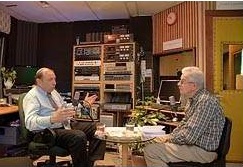
Hadassah Medical Center Bone Marrow Transplantation Expert Prof. Reuven Or recently helped the Ruby Hall Clinic in Pune, India to open a Bone Marrow Transplantation Department.
Commenting on his trip to India in an interview with the IsraCast multimedia network, Prof. Or said: “It is very important in medicine to collaborate with other centers and exchange knowledge. As we say in Hebrew, ‘Lilmod V’lilamade’ (To learn and to teach).” While in India, Prof. Or gave seminars in Mumbai and Pune, at three hospitals.
Hadassah’s physicians will continue to act as consultants to their colleagues at Ruby Hall and “help them overcome difficulties that we always have at the beginning,” says Prof. Or. The collaboration will include sharing of experiences with bone marrow treatment and joint research projects. One of the things Prof. Or will explore with his colleagues in India is the role of the immune cells from healthy donors in treating leukemia, lymphoma, and breast and ovarian cancer. Prof. Or explains that in India, they have no experience with strengthening donor immune cells in the laboratory and creating “natural killer cells” to fight the battle against cancer. Prof. Or has given his colleagues in India Hadassah’s protocols and methods, he says, “so they can become more involved with immune therapy treatment for these deadly diseases.”
Prof. Or relates that when Hadassah’s physicians first began performing bone marrow transplants, “we thought the most important part of the transplant was in the pre-transplant conditioning–the chemotherapy and radiation.” He explains, however: “We were one of the first to discover we can switch the balance from the pre-transplant preparation to the major biological impact of the transplant: the new immune cells in the recipient’s body.” It is these cells, Prof. Or says, that have the best potential to cure cancer, better than radiation and chemotherapy. Hadassah researchers found that these transplanted immune cells were able to eliminate the last tumor cells from the body of the transplant recipient more effectively than toxic reagents.
